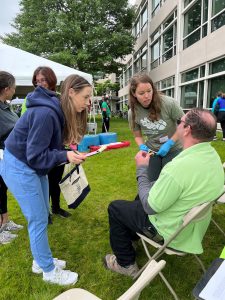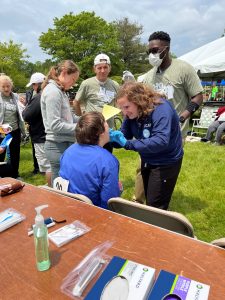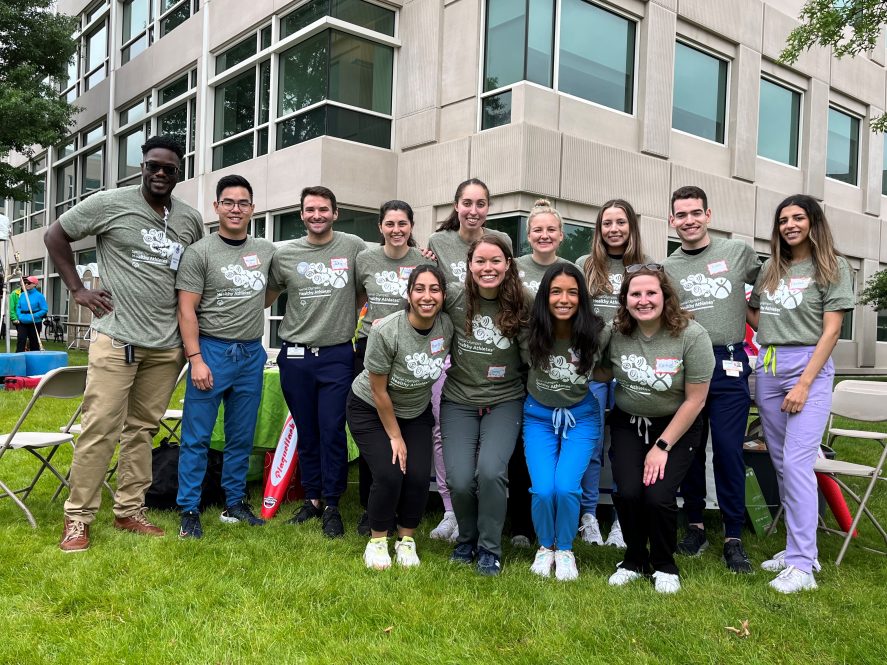For over two decades, dental students from the UConn School of Dental Medicine have been volunteering with Special Smiles a program of the Special Olympics Healthy Athletes program.
On June 3rd this tradition continued when 12 students from UConn’s Special Care Dentistry Interest Group and five faculty volunteers held a Special Smiles event and screened 36 athletes at the Cycling competition at Special Olympics Connecticut Summer Games held at Yale University’s West Campus.
 “Although we used to see many more athletes pre-COVID, this is a nice increase from last year. This was a new venue for us with only a single sports competition (cycling), so we were pleased by this turnout,” says Dr. Matthew Lepowsky, clinical director of Special Smiles for Special Olympics Connecticut and adjunct clinical instructor at the UConn School of Dental Medicine. “We screened 40% of all athletes participating in the cycling competition, the majority of whom we have not seen previously.”
“Although we used to see many more athletes pre-COVID, this is a nice increase from last year. This was a new venue for us with only a single sports competition (cycling), so we were pleased by this turnout,” says Dr. Matthew Lepowsky, clinical director of Special Smiles for Special Olympics Connecticut and adjunct clinical instructor at the UConn School of Dental Medicine. “We screened 40% of all athletes participating in the cycling competition, the majority of whom we have not seen previously.”
“Volunteering with Special Olympics Healthy Athletes is a unique opportunity for students like myself to get more comfortable and confident treating patients with special health care needs,” says Barbara Shehata, rising fourth year dental student and president of the Special Care Dentistry Interest Group. “It’s the perfect setting to connect what I’ve learned in my didactic courses and apply those skills clinically, while also giving athletes a space to cultivate trust with their dental providers.”
Special Olympics is the world’s largest sports organization for more than 4.5 million people with intellectual disabilities. Special Olympics is also the world’s largest public health organization for people with intellectual disabilities. Many Special Olympians have neglected health problems, and the Special Olympics Healthy Athletes program provides more than 1.6 million free health examinations annually in seven areas of health promotion, including dentistry.
 The Healthy Athletes program offers free health screenings and education to Special Olympics athletes in a welcoming, fun environment. According to Special Olympics, “Healthy Athletes is not only a program for athletes but, through training and hands-on experience at screenings, it is a program for healthcare students and professionals to increase knowledge of best practices in caring for and communicating with people with intellectual disabilities.”
The Healthy Athletes program offers free health screenings and education to Special Olympics athletes in a welcoming, fun environment. According to Special Olympics, “Healthy Athletes is not only a program for athletes but, through training and hands-on experience at screenings, it is a program for healthcare students and professionals to increase knowledge of best practices in caring for and communicating with people with intellectual disabilities.”
As part of the Healthy Athletes program, Special Smiles provides oral health education and dental screenings for individuals with intellectual and developmental disabilities participating in athletic competitions at Special Olympics events. Volunteers conduct oral health screenings to identify untreated dental disease, fabricate athletic mouth guards to prevent dental trauma while playing sports, and apply preventive fluoride varnish to protect teeth against cavities. The athletes are provided oral health education, as well as referral services for follow-up care if needed.
For students, volunteering with the Healthy Athletes program provides a unique opportunity to work with individuals with special health care needs outside a traditional healthcare setting. There are limited opportunities to treat patients with intellectual or developmental disabilities (I/DD) in the standard educational curriculum, and thus participating in Special Smiles increases students’ comfort working with this population.
“This experience makes dental students better prepared to treat individuals with I/DD in their future careers, and for athletes, working with dental students in a friendly, low-stress environment fosters trust in the dental profession and encourages active participation in maintaining good oral health,” says Lepowsky.



